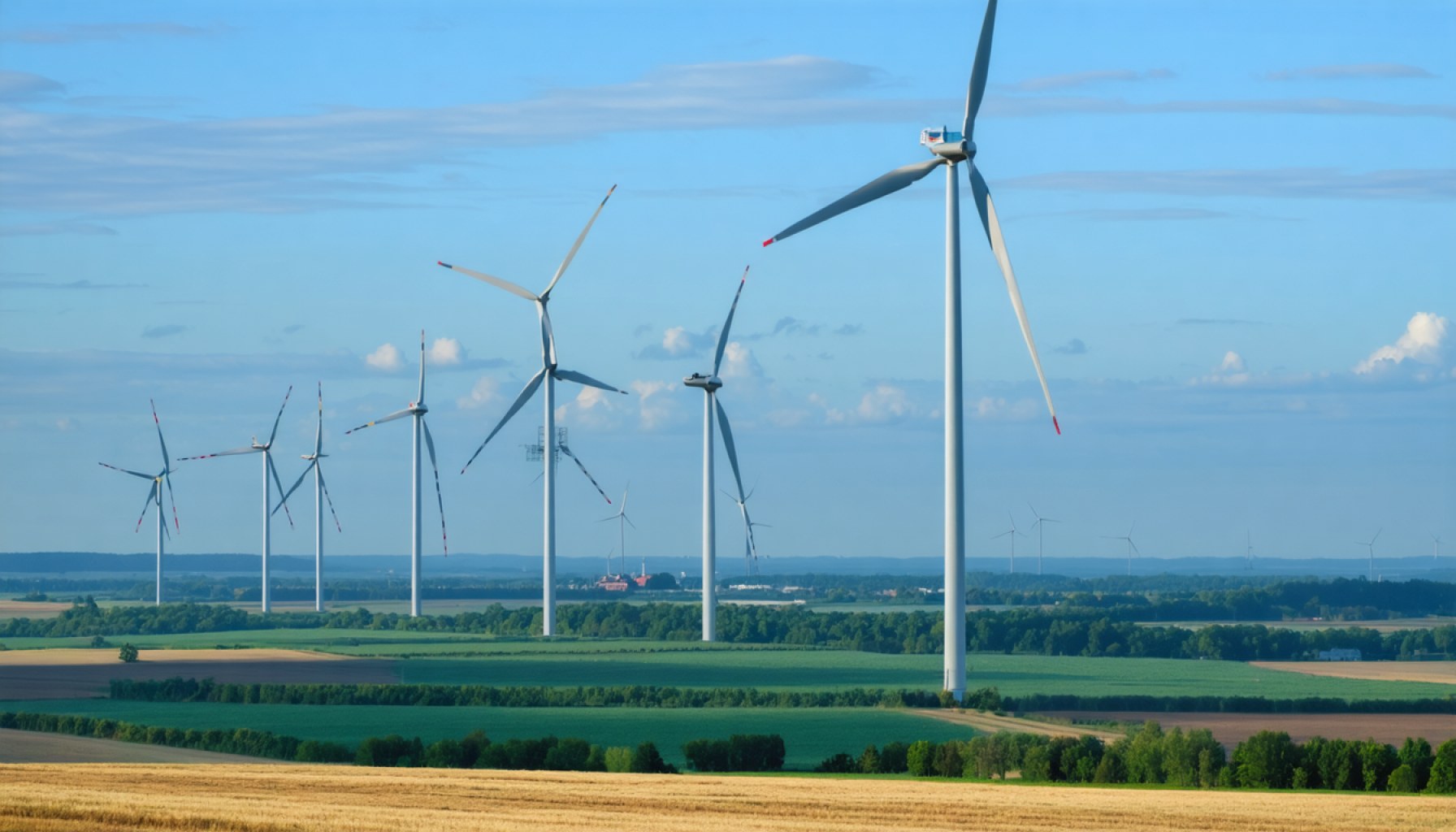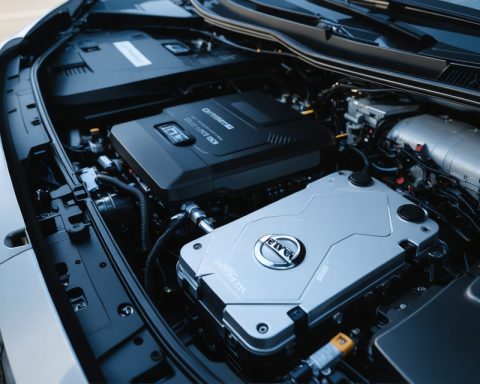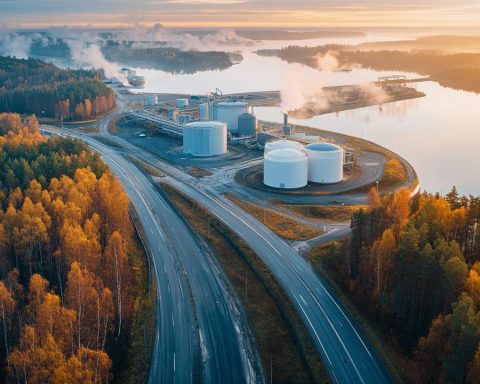- Germany is poised to redefine its clean energy agenda amidst a backdrop of political change.
- Recent elections saw the center-right Christian Democrats (CDU), led by Friedrich Merz, gaining the largest vote share.
- The far-right Alternative for Germany (AfD) unexpectedly secured the second spot, creating political ripples.
- Merz ruled out any coalition with the AfD, focusing instead on potential collaboration with the Social Democrat Party (SPD), led by Olaf Scholz.
- The CDU’s economic growth focus and the SPD’s social policies present complex negotiation challenges.
- Germany’s hydrogen strategy is crucial to Europe’s clean fuel ambitions, with a blueprint anticipated by Easter.
- The outcome will influence Germany’s energy future and its global standing in sustainable development.
Amidst a backdrop of political upheaval, Germany finds itself on the precipice of redefining its clean energy agenda. The recent election results have sent ripples through the nation’s plan for a hydrogen-powered future. As the largest share of votes landed with the center-right Christian Democrats (CDU) under the leadership of Friedrich Merz, observers are keenly watching how this will shape the path forward.
Traces of uncertainty swirl in the air. The far-right Alternative for Germany (AfD) unexpectedly clinched the second spot, sending shockwaves through the political landscape. However, Friedrich Merz, with steadfast resolve, dismissed any notion of aligning with the AfD. Instead, all eyes are on a potential coalition with the Social Democrat Party (SPD), led by the incumbent Chancellor Olaf Scholz. Despite the SPD’s significant setback, its policies might be the bridge needed to form a functional government.
As coalition talks hover on the horizon, contrasting ideologies threaten to stall progress. The CDU’s pragmatic approach to economic growth alongside the SPD’s commitment to social policies lays the groundwork for complex negotiations. Meanwhile, the clock ticks towards Easter—a tentative deadline for consensus.
The stakes are high, as Germany’s hydrogen strategy remains a significant pillar of Europe’s ambitions to lead in clean fuel. As negotiations unwind, the global community awaits the unveiling of a new blueprint that could propel Germany to the forefront of sustainable energy development. In this pivotal moment, the nation stands at a crossroads, where political foresight will direct not just its energy future, but its role on the world stage.
Germany’s Political Shifts: What They Mean for Hydrogen’s Future
How Germany’s Election Results Could Shape the Future of Hydrogen Energy
Germany is at a crucial juncture as its political landscape undergoes significant changes that could redefine its clean energy agenda, particularly its hydrogen strategy. The recent shift in electoral power, with the center-right Christian Democrats (CDU) securing the largest share under Friedrich Merz, and the unexpected rise of the far-right Alternative for Germany (AfD), brings both challenges and opportunities for Germany’s hydrogen ambitions.
Real-World Use Cases of Hydrogen in Germany
Germany has been at the forefront of adopting hydrogen as a clean energy source. Some key use cases include:
1. Transportation: Hydrogen is being used to power buses, trucks, and trains, such as the Coradia iLint train, which is operational in Lower Saxony.
2. Industry: Hydrogen is utilized to decarbonize industrial processes, particularly in steel production.
3. Energy Storage: Germany is integrating hydrogen for energy storage to balance intermittent renewable energy supply.
Market Forecasts & Industry Trends
According to a report by the Hydrogen Council, the global hydrogen market could reach $2.5 trillion by 2050. Germany’s strategic position and investments suggest it could capture a significant share of this market.
– Increased Investment: Germany plans to invest 9 billion euros in hydrogen technology under its National Hydrogen Strategy.
– Technological Innovation: Germany is expected to lead research in hydrogen technologies, focusing on cost-effective production and infrastructure development.
Reviews & Comparisons
Germany’s hydrogen strategy is often compared with other European leaders like France and the Netherlands, who also have ambitious plans.
– Germany: Focuses on green hydrogen production via electrolysis.
– France: Prioritizes nuclear-powered hydrogen production.
– Netherlands: Emphasizes importing hydrogen alongside domestic production.
Controversies & Limitations
One of the primary controversies around hydrogen energy is the energy and cost intensity involved in its production, especially for green hydrogen using renewable energy.
– Efficiency Concerns: Critics argue that the energy return on investment (EROI) is lower compared to other renewables.
– Infrastructure Challenges: Massive investment is necessary to establish hydrogen distribution networks.
Features, Specs & Pricing
– Electrolyzers: Key technology for hydrogen production; costs are expected to drop by 50% over the next decade.
– Fuel Cells: Used in vehicles; advancements are focused on improving efficiency and longevity.
– Current Costs: Green hydrogen production can range from $3 to $6 per kilogram.
Security & Sustainability
Hydrogen energy offers a sustainable alternative by reducing reliance on fossil fuels and lowering carbon emissions.
– Energy Security: Diversifies energy sources, reducing dependency on gas imports.
– Sustainability: Green hydrogen production through electrolysis is virtually emission-free.
Insights & Predictions
Experts predict that with political stability and the right strategic partnerships, Germany can emerge as a global leader in hydrogen energy.
– Political Will: Coalition outcomes could heavily influence the pace at which hydrogen strategies are implemented.
– Global Influence: As an EU leader in hydrogen policy, Germany’s success will likely encourage similar initiatives across Europe.
Pros & Cons Overview
– Pros: Clean and abundant energy source, potential for reducing emissions, and fostering energy independence.
– Cons: High costs of production, technological barriers, and the need for extensive infrastructure development.
Actionable Recommendations
1. Stay Informed: Follow coalition developments closely as they will influence energy policy.
2. Invest in Technology: Businesses interested in hydrogen should consider investing in research or partnerships in German initiatives.
3. Advocate for Policy Support: Stakeholders should lobby for supportive policies to facilitate hydrogen adoption and infrastructure development.
By understanding these key elements, stakeholders can better prepare for the evolving hydrogen energy landscape in Germany.
For more information on hydrogen initiatives, visit the official German Federal Ministry for the Environment, Nature Conservation, Nuclear Safety and Consumer Protection website for policy details.












